It’s 2023 and the clock is ticking as we race toward 2030 — the indisputable, internationally agreed upon deadline to cut global emissions by half if we want to mitigate the most disastrous effects of climate change.
We have seven years.
And we are committed to doing what is necessary to preserve rainforests, protect the climate, and uphold human rights.
We believe creativity, integrity and people power drive the success in our campaigns and in our organization. And over the last year we have witnessed a community of activists across the globe — including people like you — rise up.
Thank you for being with us every step of the way. Our voices are being heard.
The victories we achieved in 2022 — from groundbreaking bank policies ruling out financing for new oil and gas, to data indicating a decrease in deforestation rates in Indonesia, to the first policy by a US insurer to respect Indigenous consent — were the result of the tireless efforts from RAN, our partners, and YOU. And they are proof that people power, YOUR power, works.
But there is still so much to be done.
In 2023, with your support, we will leverage the growing momentum of last year’s achievements, and the global movement toward a just and sustainable future, to expand our campaigns and build on the work that you’ve made possible.
One of our core strategies to achieve our mission at RAN is to force the biggest banks and businesses to shift their destructive policies and practices — in other words, to Challenge Corporate Power.
Here are seven ways we plan to do so in the coming year…
#1. Support the Fight of the Long Isun Community in Indonesia
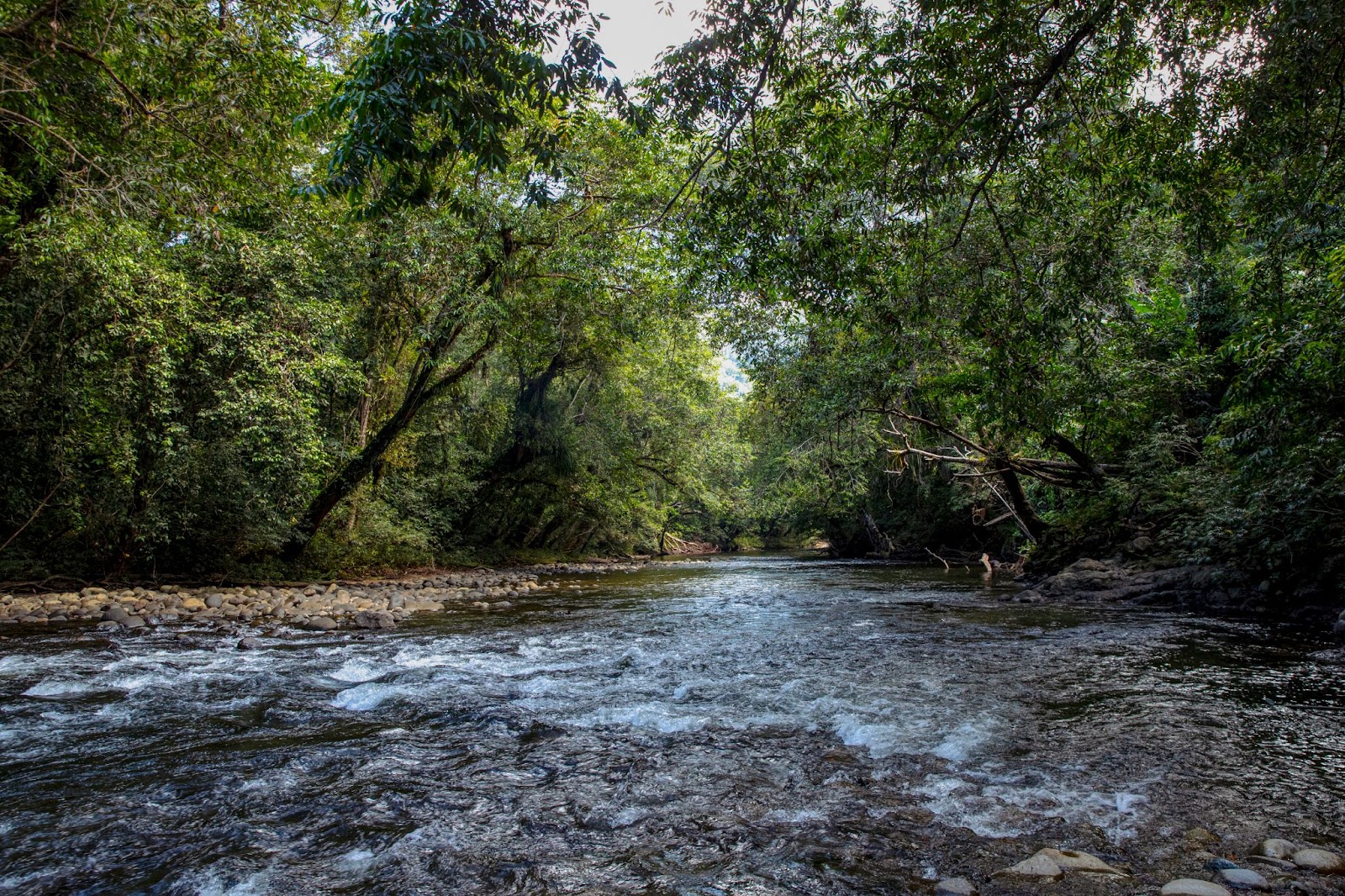
The charm of the pristine, dense rainforest in Langasah River. Photo taken in Long Isun Village, Long Pahangai District, Mahakam Ulu Regency, East Kalimantan on July 20th, 2022.
The rainforests that stretch across North and East Kalimantan on the Indonesian island of Borneo are some of the last intact forests in Indonesia — but not for long if they are not protected. Influential corporate groups in the palm oil and timber sectors have been given the green light to convert millions of acres of the forests into plantations for logging and agribusiness production. The good news is there is still time. More than 60% of the palm oil concession land has yet to be developed. That’s why this fight is so critical. The Long Isun community is one of the last Indigenous communities along the great Mahakam river whose forests remain standing. And RAN is supporting this community in their fight to secure legal recognition of their Indigenous territory right now.
#2. Ramp up the pressure on Procter & Gamble and Mondelēz, two of the worst profiteers from the destruction of rainforests of Indonesia
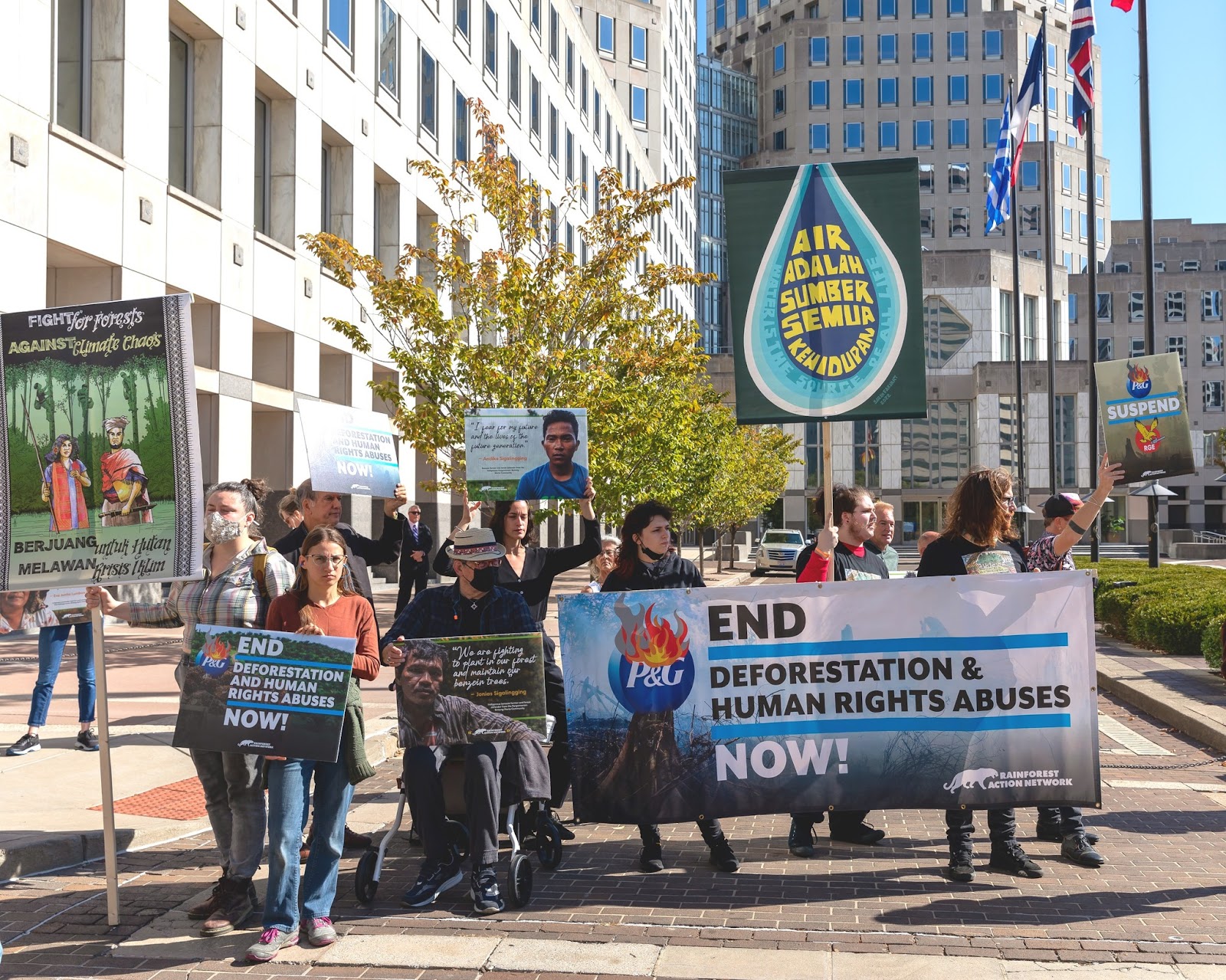
A group of RAN staff and local activists protest in solidarity with the Pargamanan-Bintang Maria community of North Sumatra, Indonesia at the P&G headquarters during their annual AGM.
We have followed the supply chain from the rainforests to the biggest brands on supermarket shelves — and we have followed those profits all the way to corporate boardrooms. Multinational giants like Mondelēz and Procter & Gamble, known for products such as Oreos and Charmin, are sourcing palm oil from Harita Group, the company that is currently threatening to destroy the Long Isun community’s way of life. Harita Group is one of the most influential corporate groups in the palm oil and pulp and paper sectors in Indonesia. Both Mondelēz and Procter & Gamble are complicit in the violation of Indigenous rights that stem from their relationship with the Harita Group. We will stand in solidarity with Long Isun and pressure Mondelēz and Procter & Gamble to suspend companies tied to violations until land is returned to Indigenous communities.
#3. Call out Liberty Mutual’s new CEO, and pressure the entire insurance sector to adopt policies to defund climate change

You may not have heard of him yet, but Tim Sweeney just became a critical decision-maker when it comes to the fate of the fossil fuel industry’s global expansion plans. As of January 1, Sweeney is the new CEO of Boston-based insurance giant Liberty Mutual, which is one of the biggest coal, oil, and gas insurers in the world. From day one, we’re swarming Liberty Mutual with a unified message: New CEO Tim Sweeney must choose: Will he continue to support / prop up the fossil fuel industry’s plans to ramp up coal, oil, and gas extraction, or instead join the movement to stop insuring disastrous projects and adopt responsible policies to accelerate a just energy transition?
#4. Increase pressure on JP Morgan Chase and Bank of America for their funding of the fossil fuel industry
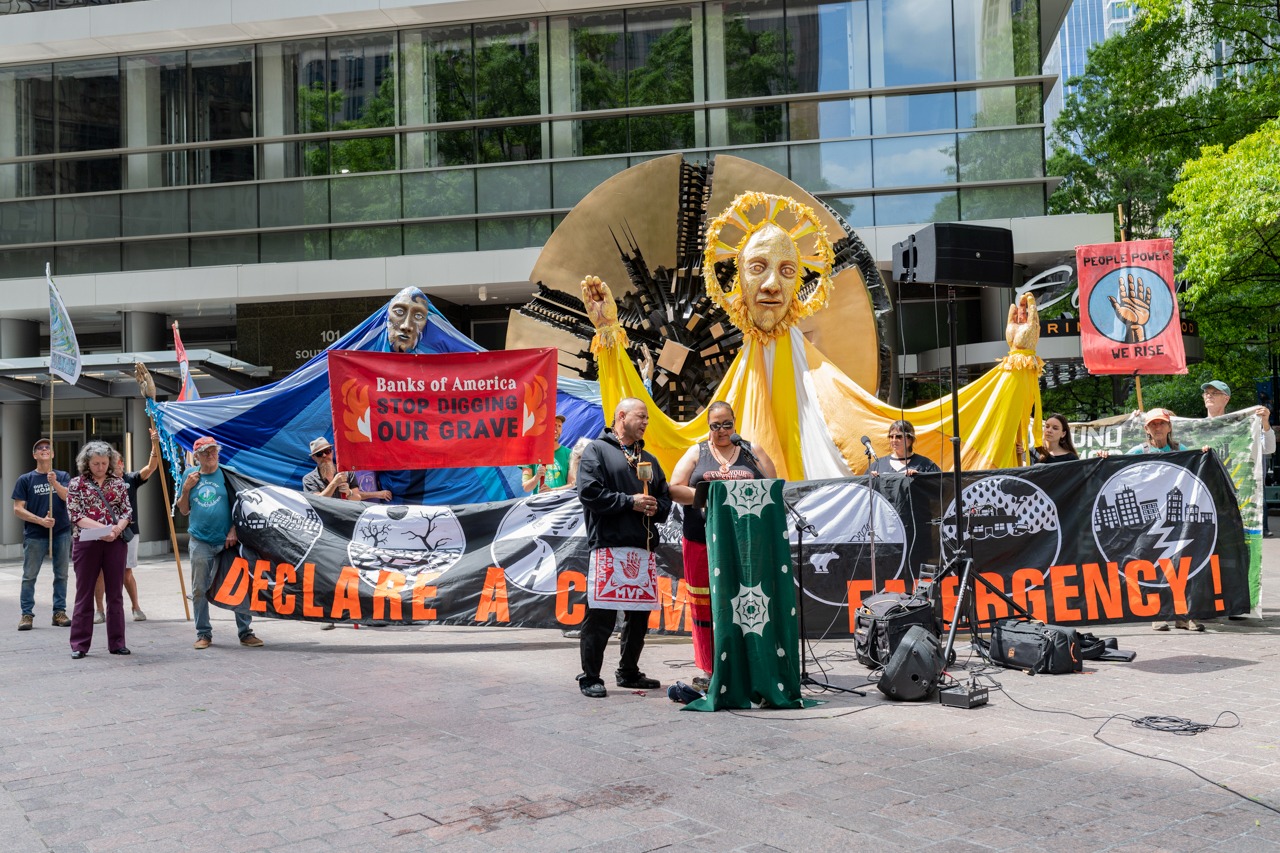
RAN activists and allies at GreenFaith protest outside the Bank of America headquarters at their annual AGM.
Photo: Kalyxa Roman
JP Morgan Chase (JPMC) remains the worst funder of the fossil fuel industry. Bank of America (BoA) comes in at number four. In the five years after the Paris Agreement, Bank of America provided $232 billion in lending and underwriting to the fossil fuel industry. Last year, both JPMC and BoA patted themselves on the back for being climate leaders after setting “intensity emissions” targets for 2030. It’s the ultimate greenwashing scandal — any intensity-based metric can still allow for an increase in absolute emissions, and fossil fuel expansion. We are calling on these banks to stop funding fossil fuel expansion. Period.
#5. Provide critical data for the global movement with the release of our annual Banking on Climate Chaos report and Keep Forests Standing scorecard
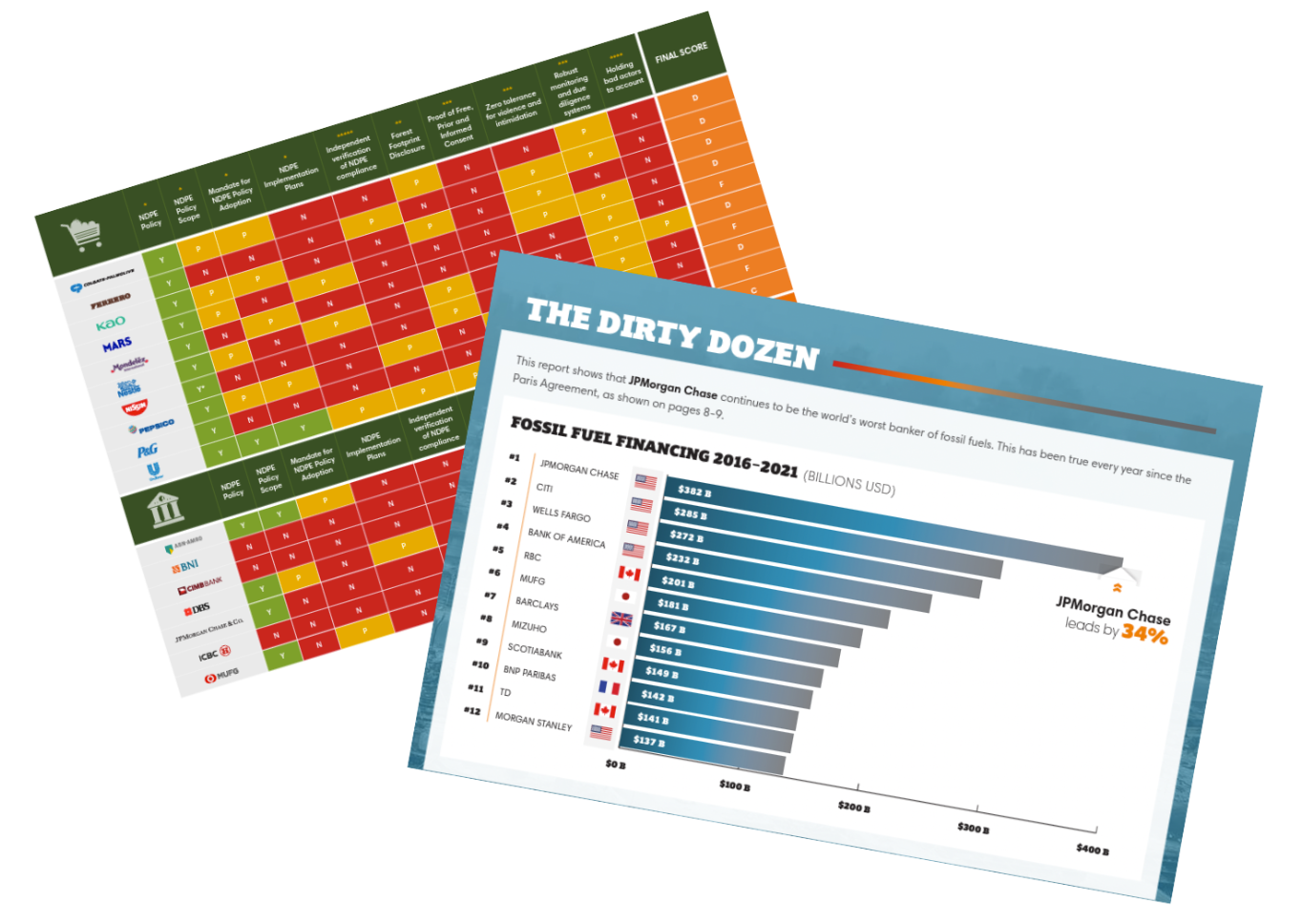
RAN’s globally recognized, cutting-edge research and reporting on the role of global finance continue to be the industry standards and go-to sources on the link between banks, brands, fossil fuels, deforestation, and climate chaos. These reports are key to our inside/outside approach: providing tools for mounting public pressure, and data for corporate negotiations with the most destructive banks and brands.
#6. Direct funding and resources to frontline communities through our Community Action Grants
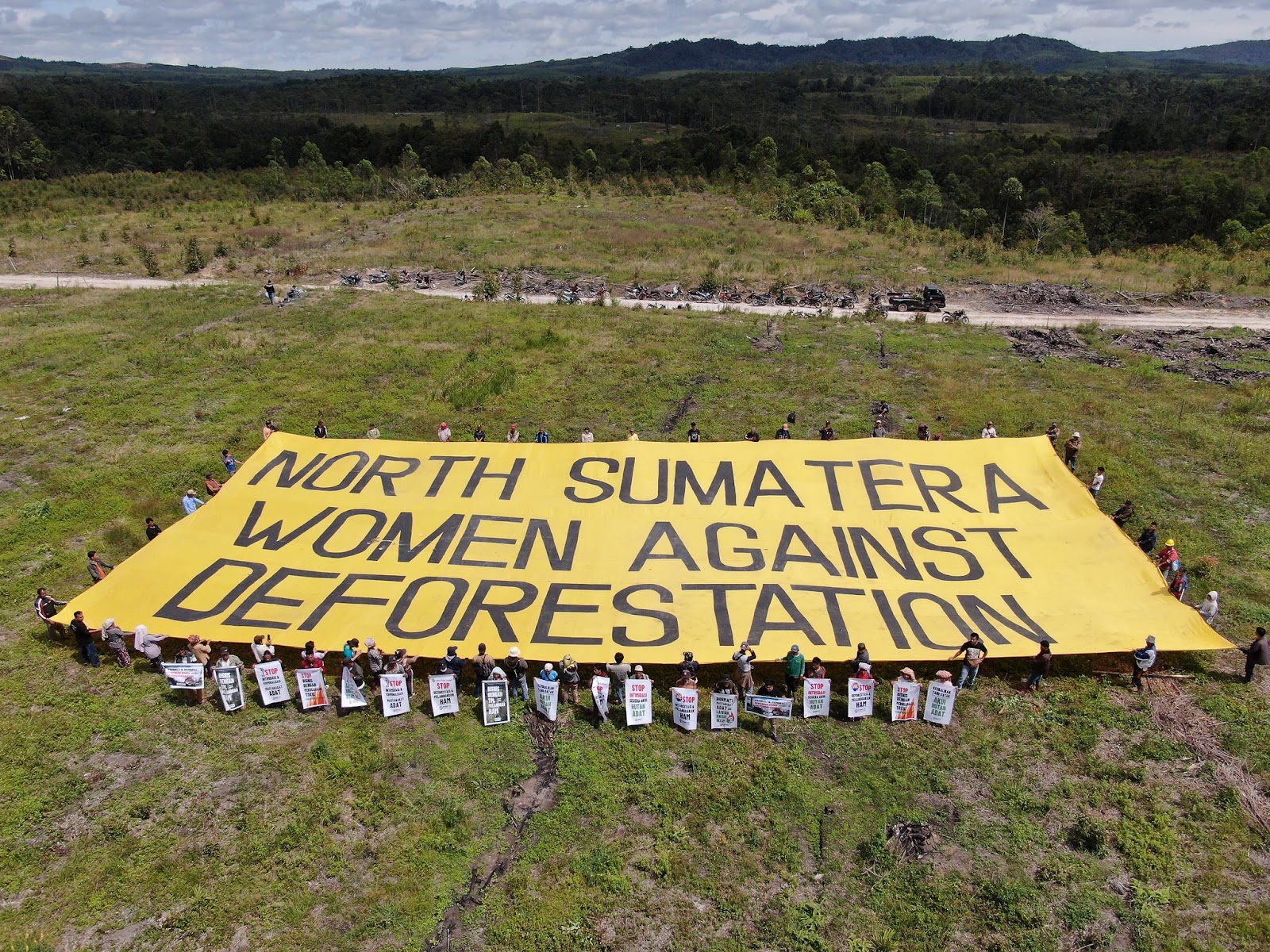
Over 70 Indigenous Batak people from 9 different communities gather on their customary land holding signs that read “Indigenous Women Against Deforestation.”
Photo: KSPPM
RAN Community Action Grants provide crucial and rapid funding for people fighting in their own communities across the globe to protect millions of acres of forest, to keep millions of tons of carbon in the ground, and to protect the rights and self-determination of local communities. Last year, we were able to give over 80 grants totaling more than $775K (including through our partnership with Global Greengrants Fund) to frontline and Indigenous-led organizations primarily in Indonesia, the Amazon region, and North America.
#7. Educate, train and steward our growing community of activists
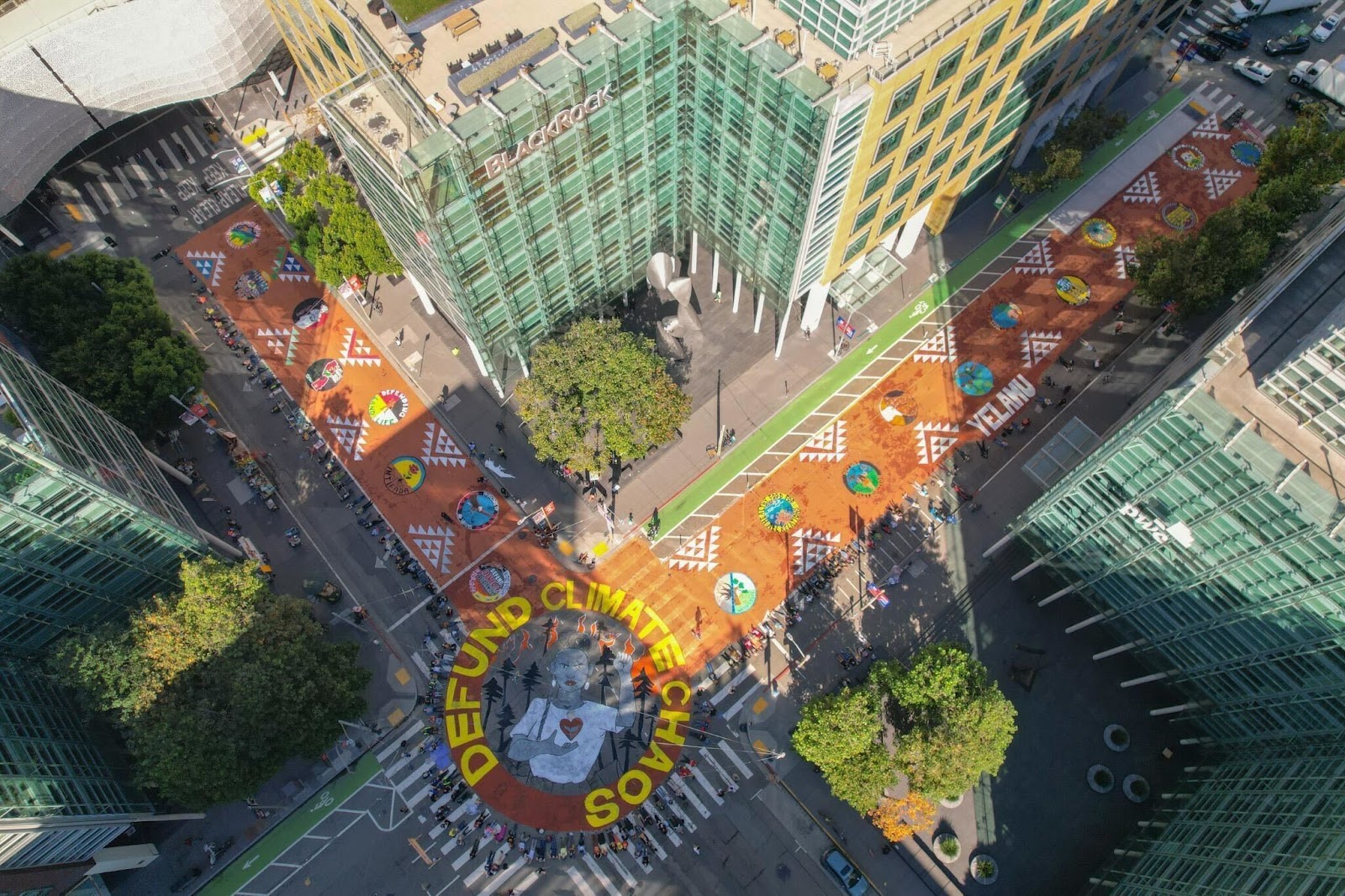
Activists take to the streets in San Francisco and paint massive murals with a clear message for big banks: Defund Climate Chaos.
This year we will expand our presence in the streets around critical movement moments like the annual shareholder meeting season in the spring. We are also increasing our activist training opportunities with climb trainings, webinars and more. One of our core values is People Power because our fight for a sustainable future would not be possible without each and every one of our supporters — including you.
* * *
I cannot overstate the impact of your commitment to people and planet. We truly appreciate your investment in this work.
See you in the streets,
Ginger Cassady
